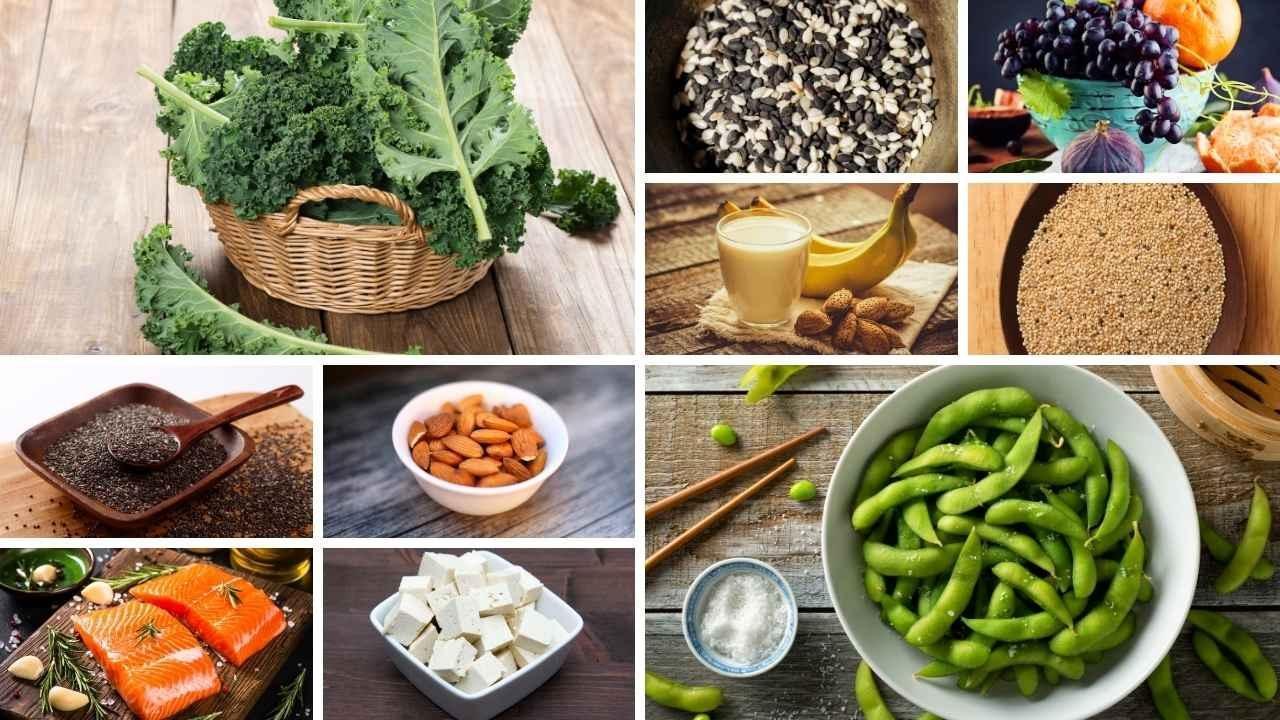
Post by : Mikhael Nasser
Calcium is essential for maintaining strong bones and teeth, enabling muscle function, and supporting healthy nerve and heart activity. While dairy is commonly associated with calcium, a wide range of non-dairy foods also deliver significant amounts of this mineral and can be incorporated into daily diets.
Whether you follow a plant-based diet, have lactose intolerance, or simply want to add variety, these accessible calcium-rich foods can help meet nutritional needs without relying solely on milk.
Below are ten practical food choices that offer meaningful calcium contributions across meals and snacks.
Small but nutrient-dense, chia seeds pack a notable calcium punch. Two tablespoons supply roughly 18% of the average daily calcium requirement. They also provide fiber, plant protein, and omega-3s. Use chia in smoothies, prepare a pudding, or sprinkle them over yogurt and fruit to boost calcium and satiety.
Almonds are a convenient calcium source and contain heart-healthy fats. A modest handful delivers about 75 mg of calcium, alongside vitamin E and magnesium, which support bone and cardiovascular health. Enjoy them as a snack, mix into cereals, or spread almond butter on wholegrain toast.
Fatty fish with edible bones, such as sardines and canned salmon, supply concentrated calcium and phosphorus—both vital for skeletal strength. A 100 g serving of sardines can exceed 300 mg of calcium and also provides vitamin D, enhancing calcium absorption. Add them to salads, sandwiches, or pasta dishes for a nutrient-dense meal.
Tofu made with calcium salts (calcium-set) can be a reliable calcium source, with typical servings offering roughly 350 mg of calcium. It is also rich in plant protein and minerals, making it an excellent option for vegetarians and vegans. Use tofu in stir-fries, soups, or blended recipes to increase calcium intake.
Leafy greens—such as kale, bok choy, and certain varieties of spinach—contribute calcium as well as vitamin K and antioxidants. One cup of cooked kale provides about 170 mg of calcium. Incorporate these greens into salads, sautés, or soups to diversify nutrient intake and support bone health.
Sesame seeds are compact sources of calcium; a single tablespoon contains nearly 90 mg. Tahini, a paste made from ground sesame, is another flavorful way to benefit from these seeds. Sprinkle sesame on salads, rice, or toast, or use tahini in dips like hummus to add both taste and calcium.
Edamame (young soybeans) are versatile and nutrient-rich. One cooked cup offers around 100 mg of calcium, plus protein, fiber, and vitamin K. Steam or boil edamame as a snack, or mix it into grain bowls and salads for a calcium-friendly boost.
Many plant-based milks—almond, soy, oat and others—are fortified with calcium and vitamin D to match or approach the calcium content of cow's milk. One cup of fortified plant milk often contains comparable calcium; always check labels and shake cartons before use to ensure even distribution.
Amaranth is an ancient, gluten-free grain notable for its mineral density. One cooked cup supplies about 115 mg of calcium along with magnesium and iron. Use amaranth in porridges, salads, or as a side to diversify grains and increase calcium intake.
Certain fruits also contribute calcium—fresh oranges and dried figs are among the better options. A single orange supplies around 60 mg of calcium, while several dried figs can offer over 100 mg. These fruits also provide vitamin C, which aids calcium absorption.
Beyond bone formation, calcium supports muscle contractions, blood clotting, and steady heart rhythm. Insufficient dietary calcium can prompt the body to withdraw calcium from bone stores, increasing long-term fracture risk and contributing to conditions such as osteoporosis. Regular intake of calcium-rich foods helps preserve skeletal integrity.
Pair calcium sources with vitamin D-rich foods (e.g., fatty fish or fortified items) to improve uptake.
Limit excessive salt and caffeine, which can impair calcium retention.
Maintain adequate hydration across the day.
Consume a variety of calcium-containing foods rather than relying on a single source.
Including these non-dairy calcium options—such as chia, almonds, calcium-set tofu, and leafy greens—makes it straightforward to support bone strength and overall health without depending solely on milk. Thoughtful food choices across meals can help sustain energy and skeletal resilience over time.
When planning menus, remember that calcium appears in many different foods; diversifying your choices is an effective strategy for long-term bone health.
This article is provided for general information and educational purposes only and does not substitute professional medical or nutritional counsel. Individual needs vary by age, health status, and lifestyle. Consult a qualified healthcare professional or registered dietitian before making major dietary changes or beginning supplements to ensure recommendations are appropriate and safe for your circumstances.










Shreyas Iyer Under Intensive Observation in Sydney After Rib Injury
India vice-captain Shreyas Iyer is in a Sydney ICU following internal bleeding from a rib injury sus

NBA Friday Recap: Powerhouse Wins for Miami, LA, Milwaukee, and Clippers
Miami, LA Lakers, Milwaukee, and Clippers triumphed in a thrilling NBA Friday, showcasing standout p

Doncic Shines with 49 Points in Lakers' 128-110 Victory over Timberwolves
Luka Doncic dazzles with 49 points as the Lakers secure a 128-110 win against the Timberwolves, show

Kings Triumph Over Jazz 105-104 with Last-Minute Sabonis Effort
The Sacramento Kings edged out the Utah Jazz 105-104, with Domantas Sabonis making the decisive shot

Argentina's Friendly Match Against India Delayed, New Date to be Announced
The friendly match between Argentina and India in Kochi has been postponed due to FIFA approval dela

Rohit and Kohli Conclude ODI Journeys in Australia with a Victory
Rohit Sharma and Virat Kohli bid adieu to Australian ODIs with a final win, forming a 168-run partne